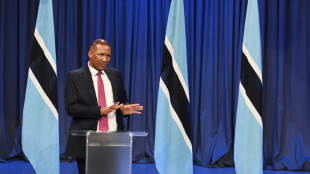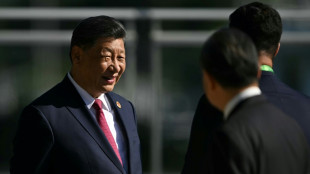

Putin tells Russian mothers he shares 'pain' of soldier deaths
Russian President Vladimir Putin on Friday told a group of mothers whose sons are fighting in Ukraine that he shares the pain of those who have lost loved ones in the conflict.
The carefully choreographed meeting at Putin's residence took place as anger simmers in Russia over a chaotic military draft and deaths of soldiers in Ukraine.
At least one woman at the meeting wore a black headscarf, apparently marking a recent loss.
"I want you to know -- I personally and the entire leadership of the country share this pain," Putin told the group ahead of Mother's Day, which is celebrated in Russia on Sunday.
"We understand that nothing can replace the loss of a son, a child," Putin said.
He offered condolences to one of the women saying her son did not die "in vain" and reiterated his pledge to fulfil Moscow's goals in Ukraine.
Russian authorities have introduced legislation that effectively bans any public criticism of the offensive. Kremlin critics accuse authorities of concealing the real number of dead and wounded Russian troops.
Putin told the 17 women that Moscow was fighting the "neo-Nazi regime" in Ukraine and warned that they should be wary of what they read on the internet.
"It is clear that life is more complex than what is shown on our TV screens or even on the internet, nothing can be trusted there," he said.
- 'Answer our questions' -
He also denounced what he called attempts by "the enemy" to "devalue (and) compromise" Moscow's tactics in Ukraine.
Anger and concern have built across Russia since September, when the Kremlin announced that hundreds of thousands of well-trained and well-equipped men would be conscripted and sent to the battlefield to bolster Moscow's struggling campaign in Ukraine.
But chaos ensued, with widespread reports of exempted men -- the elderly or infirm -- being dispatched to the front or conscripts dying after receiving nearly no training, forcing the Kremlin to concede "mistakes".
The meeting -- the first of its kind since Putin launched the offensive on February 24 -- is a sign that the Kremlin takes the growing malaise seriously.
Ahead of Putin's meeting, some activists said the get-together would not offer a platform for frank discussion.
"The president will meet with some mothers pulled out of his pocket, who will ask the right questions and thank him," said Olga Tsukanova, an activist mother.
"I'm not alone. Invite us, Vladimir Vladimirovich, answer our questions!" she told AFP ahead of the meeting.
Tsukanova was not invited to meet Putin.
- 'Muddy trenches' -
National television broadcast some critical comments from mothers who attended the meeting, however.
One woman, whose husband and two sons went to fight in Ukraine, said there were not enough camouflage robes.
"The uniform becomes unusable very quickly, the trenches are muddy and damp," she added in televised remarks.
Another mother was shown on TV thanking Putin for "taking care" of the women.
Anger over the fate of mobilised men has put the Kremlin in an uncomfortable position, analysts say.
While authorities have unleashed an unprecedented crackdown on political dissent, the word of mothers appears sacred in Russia.
Imprisoning them is not an option, observers say.
Two wars in Chechnya led to the rise of the mothers' movement in Russia that became a thorn in the Kremlin's side.
But this time the climate is different, with no independent media left in the country.
- 'Not a peace movement' -
This means there has been little public questioning of the military campaign in Ukraine. But in Russia some are asking questions about the conditions in which their husbands and sons are sent to fight.
Mothers' and wives' status as relatives of mobilised men serving the country gives them a form of protection.
"There is a subconscious feeling that women have that right" to hold power to account, sociologist Alexei Levinson of the independent Levada Centre said.
"But this is not a women for peace movement," he warned.
"They want the state to fulfil its responsibility as a 'collective father' towards the mobilised."
For now, the soldiers' mothers' movement is uncoordinated and disparate, mainly consisting of worried relatives posting videos on social media.
In a climate of suspicion not seen since the Soviet era, many women fear that complaining about the offensive could mean trouble and refrain from speaking to the foreign press.
"We have sent letters to authorities," one woman told AFP anonymously.
"It's not the journalists that will take our guys out of the trenches and we do not want to harm them even more."
A.Roth--MP




